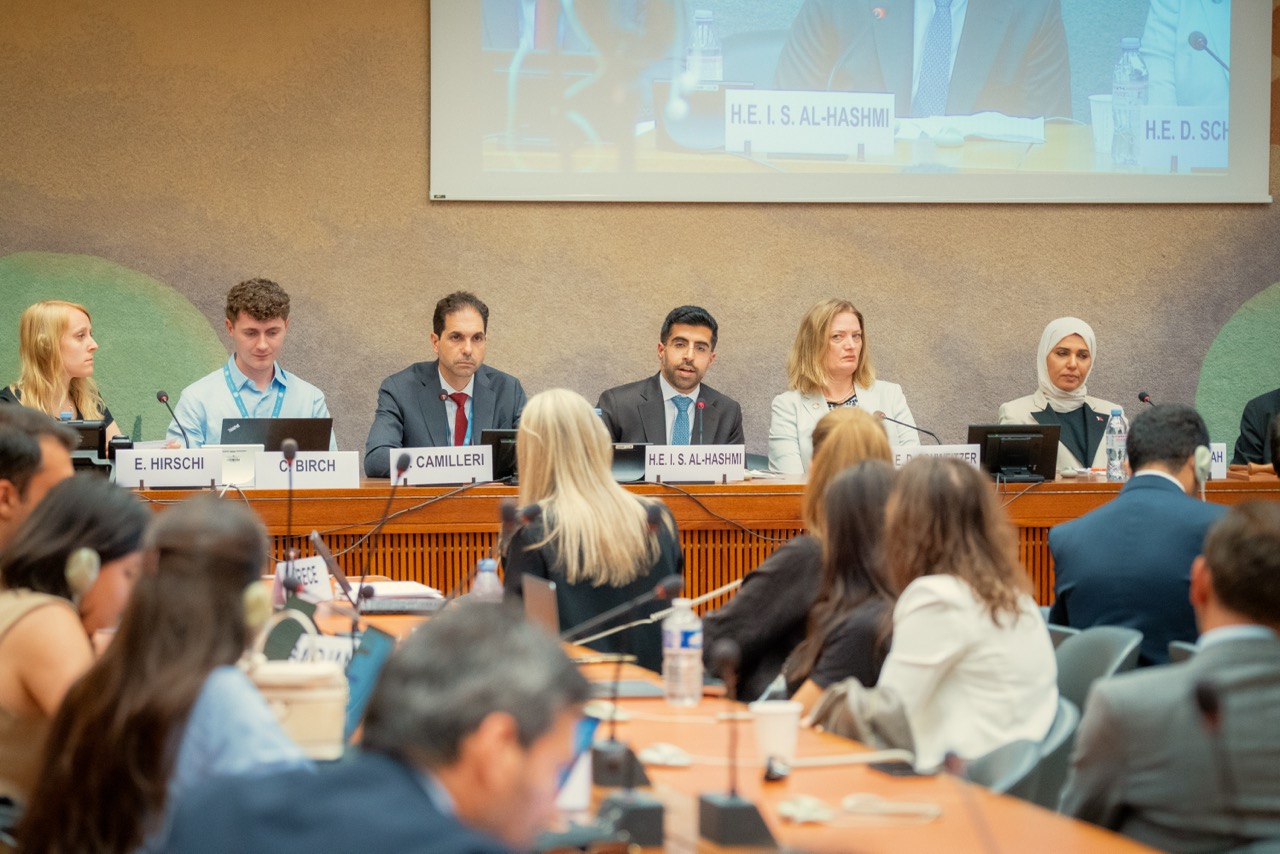Qatar Permanent Mission in Geneva Organizes Side Event on Role of Media in Enhancing Human Rights

Geneva, June 20, 2025
The Permanent Mission of the State of Qatar to the United Nations Office and other international organizations in Geneva, in cooperation with the permanent missions of Austria, Greece, and France, organized a side event today om the role of media in promoting human rights, on the sidelines of the 59th session of the Human Rights Council in Geneva.
Among the speakers were HE Permanent Representative of the State of Qatar to the UN in Geneva Dr. Hind Abdulrahman Al Muftah, Director of the Department of Media and Communication at the Ministry of Foreign Affairs Ibrahim bin Sultan Al Hashmi, HE Austria’s Permanent Representative to the UN in Geneva Desiree Schweitzer, HE Greece’s Permanent Representative to the UN in Geneva Ioannis Ghikas, HE UN Special Rapporteur on the Right to Freedom of Expression Irene Khan, representative from the Office of the UN High Commissioner for Human Rights Michael Camilleri, Executive Director of Fondation Hirondelle Caroline Vuillemin, Callum Birch, Senior UN Advocacy Officer at ARTICLE 19, and Advocacy Director at the International Press Institute (IPI) Amy Brouillette. The event was moderated by CEO of Investigativ.ch Eva Hirschi.
The event was attended by more than 80 participants, including diplomats, international and regional organizations, media institutions, and civil society organizations focused on human rights, peace, and development.
HE Dr. Al Muftah emphasized that media is a foundational pillar of contemporary society, playing a crucial role not just in shaping public opinion and facilitating information flow, but also in defending democratic values, human rights, dignity, equality, and justice. She said that media also helps bridge divides by promoting our shared humanity.
Her Excellency highlighted that Article 19 of the Universal Declaration of Human Rights, which guarantees the right to freedom of expression including the right to seek receive, and impart information regardless of frontiers. She stressed that freedom of expression and freedom of the press are interlinked and essential for an informed and engaged society.
She noted that in the face of rising misinformation and polarization in a rapidly changing world, it has become more urgent than ever to understand and strengthen the relationship between media and human rights. She stressed that when media adheres to ethical standards and truth, it doesn't just reflect reality, but becomes a powerful force for positive change, raising awareness, empowering individuals, and advancing global human rights.
She added that journalists serve as the first line of defense for transparency and accountability in the information age, yet they face increasing threats, harassment, arrests, and even death for doing their jobs. She underscored that governments have a legal and moral responsibility to ensure a safe environment for journalists and media professionals to operate without fear of violence or retaliation.
She also called for renewing collective commitment and joint efforts to protect press freedom, defend truth-tellers, and safeguard the essential role of media in promoting and protecting human rights.
For his part, Al Hashmi said that the State of Qatar’s media model is based on supporting strong and credible media institutions in a secure environment that enables them to fulfill their vital role. He said the government respects journalists and maintains open, transparent engagement with them, while also actively working through diplomatic and multilateral channels to empower the media and provide necessary protections.
He affirmed the State of Qatar’s ongoing sponsorship of major global initiatives, highlighting its role in promoting UN Security Council Resolution 1738 (2006) on protecting journalists in armed conflicts during Qatar’s presidency of the council.
He also referred to the State of Qatar’s hosting of the 2012 International Conference on the Protection of Journalists in Dangerous Situations, and the 2016 launch of the Doha Declaration on the Protection of Journalists, which outlined core principles for journalist protection and clarified the responsibilities of states, organizations, media entities, and journalists themselves.
Al Hashmi noted that Qatar’s Media City hosts many local, regional, and international media outlets that operate freely in a secure and strong media environment.
UN Special Rapporteur Khan said that killing even one journalist is not just a loss of life, it sends a chilling message to others and fosters silence. She warned that lack of safety for journalists creates a climate of self-censorship, reinforcing the need for accountability for those who attack or kill journalists.
She also drew attention to the serious violations journalists face in Gaza, the restrictions on media access to the territory, and the heightened risks for female journalists, especially in the digital realm. She pointed out that online gender-based violence is spilling over into real-life consequences for women in journalism.
Khan warned that such smear campaigns can seriously endanger journalists by legitimizing violence against them, particularly when they are covering protests or operating in hazardous areas. She noted that this also undermines public trust in journalism.
In the same context, speakers emphasized the critical role media plays in promoting and protecting human rights. They acknowledged the growing challenges faced by journalists, especially amidst rising hate speech, misinformation, and restrictions on free expression.
They stressed the importance of empowering media to operate freely and independently, seeing it as a core tool for raising awareness, exposing abuses, and upholding justice and accountability.
They underlined that combating impunity for crimes against journalists is vital to safeguarding media freedom and ensuring a safe environment where journalists can carry out their work without fear. Repeated targeting of journalists, they warned, undermines public trust and threatens society’s right to know.
They also stressed that states have a legal and moral obligation to provide a safe environment for the press and protect journalists from threats or intimidation. They highlighted the importance of sustainable funding for media institutions to allow them to function independently of political or financial pressures.

